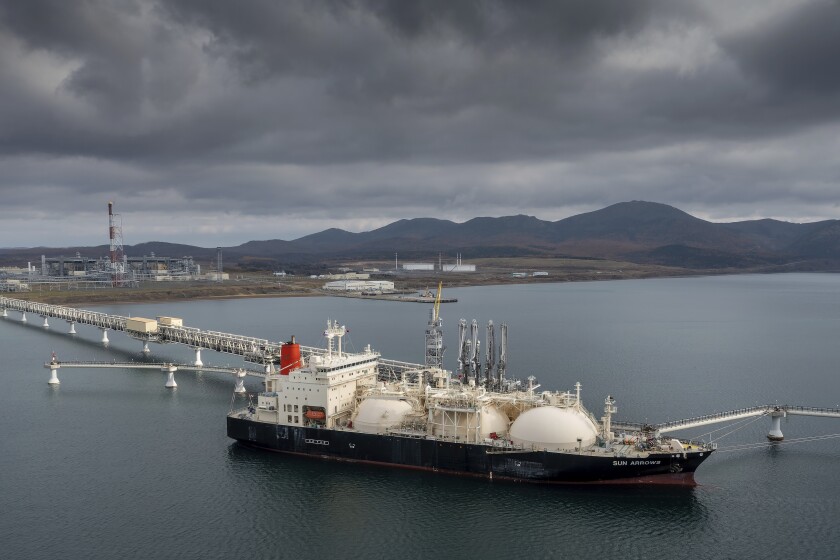Is the EU jammin with Russia this winter ?
These bureaucrats are into their best Marie Antoinette imitations. Biden going to sanction China and Russia.
Do not worry we have made the supply chains much safer and secure with blockchain.
5 hours ago — The reasons vary: cold weather last winter, lack of Russian deliveries on the spot market and robust demand in Asia for liquid natural gas that ..
EXPLAINER: How Europe is trying to deal with its gas crisis

FILE - The tanker Sun Arrows loads its cargo of liquefied natural gas from the Sakhalin-2 project in the port of Prigorodnoye, Russia, on Friday, Oct. 29, 2021. Europe’s natural gas woes are far from over in Jan. 2022. Prices are high. Underground reserves that are relied on in cold weather are low. Russia’s state-owned Gazprom isn’t selling as much spot gas as it used to. The pipeline operators have told the European Union’s executive commission that if there’s a cold winter, the continent’s gas companies will need to import more than they have in the past. (AP Photo, File)
(Uncredited / Associated Press)
BY DAVID MCHUGH
ASSOCIATED PRESS
JAN. 13, 2022 8:08 AM PT
FRANKFURT, Germany — Europe’s natural gas crisis isn’t letting up. Reserves are low. Prices are high. Utility customers are facing expensive bills. Major Russian supplier Gazprom isn’t selling gas like it used to.
It all raises the question: How exactly is Europe, which imports most of its energy, going to make it through the winter without a gas disaster, especially if the season turns out to be colder or longer than usual?
Here’s how the European Union, home to 447 million people, will try to deal with the crisis:
THE PROBLEM IS LOW STORAGE LEVELS: Utilities turn to gas stored in underground caverns to handle sudden additional demand for gas for heating or electricity. Europe started 2021 with gas storage only 56% full, compared with 73% a year earlier. The reasons vary: cold weather last winter, lack of Russian deliveries on the spot market and robust demand in Asia for liquid natural gas that comes by ship. Europe’s association of pipeline operators says cold weather would mean needing to import 5% to 10% more gas than the maximum volumes observed in recent years to avoid the risk of shutoffs.
ADVERTISING
AS A RESULT, GAS PRICES HAVE SOARED: The benchmark price in Europe is around 80 euros per megawatt hour, more than four times its level of 19 euros at the start of 2021 and up from as low as 4 euros in 2020. Prices have eased from as much as nine times their level at the start of last year. That price shock is hitting utility bills, alarming consumers and politicians.
EUROPE IS RELYING ON HIGH PRICES ATTRACTING MORE SUPPLY: Analysts at Rystad Energy used ship-tracking data last month to watch 11 tankers bringing liquid natural gas, or LNG, to Asia make U-turns in the middle of the ocean to take advantage of lucrative sales in Europe. With prices so high, traders were tempted to divert cargoes to Europe even if they had to offer 100% of the price as compensation, analysts at data firm Energy Intelligence said.
“I wouldn’t say that LNG is 100% enough, but it will play a very important role” in Europe’s energy solution, said Xi Nan, head of liquid natural gas markets at Rystad.
RUSSIA HASN’T SENT AS MUCH GAS: State-owned Gazprom has sold less short-term gas and hasn’t filled as much of its European storage as it normally does, but Russian officials emphasize that that the company has met its supply obligations under long-term contracts.

PAID CONTENT
Blazing New Trails in Drug Discovery at Bristol Myers Squibb
By Bristol Myers Squibb
Imagining the future of medicine and healthcare is one thing, evolving those ideas from science fiction to science reality is quite another. But that’s exactly what the Bristol Myers Squibb (BMS) Research & Development site in San Diego is...
Analysts believe Russia may be underlining its desire for Europe to approve the Nord Stream 2 pipeline to Germany that bypasses Poland and Ukraine. There also are increased tensions over Russian troop deployments near the Ukraine border.
The EU’s antitrust chief said Thursday that Gazprom’s limitations on supplies is “thought provoking” amid the surge in prices, asking the company and other suppliers for an explanation. Competition Commissioner Margrethe Vestager described Gazprom’s attitude as a “quite rare behavior in a marketplace.”
A MILD WINTER IS KEY: Weather in Europe and Asia has so far been relatively mild, more liquid gas is on the way, and high prices have forced industries to use less by cutting back on production. Meanwhile, Norway, among Europe’s suppliers, has stepped up with more pipeline gas.
“It means we can get through this winter with Russian flows being as low as they are,” said James Huckstepp, manager for Europe, Middle East and Africa gas analytics at S&P Global Platts. “I wouldn’t say crisis averted yet, because there is still risk of low temperatures, and there is very little storage buffer.”
If there’s an unexpected freeze, “you go to a more extreme scenario, and you could have forced cutoffs of gas — it would start with industry, but eventually the consumers are at risk,” Huckstepp said.
IN THE SHORT TERM: European governments are offering cash subsidies to consumers to soften the blow. Sweden became the latest Wednesday by announcing 6 billion kronor ($661 million) to help households most affected by higher electric prices.
LONGER TERM: The solution is more investment in renewables such as wind and solar. Yet officials concede gas will play a role for years during that transition.
POLITICAL UNREST IN KAZAKHSTAN ISN’T CONTRIBUTING: The resource-rich Central Asian country supplies oil to the EU — but not gas — and the oil flow wasn’t affected by violent protests that began over soaring fuel prices but quickly spread, reflecting wider discontent over Kazakhstan’s authoritarian government.
IF ALL ELSE FAILS: EU legislation requires countries to help each other in the case of a gas shortfall. Governments can declare a gas emergency and shut off industrial customers to spare households, hurting the economy but sparing a humanitarian and political disaster.
In theory, they can demand cross-border gas supplies from each other. In recent years, Europe has built more reversible pipeline connections but not enough to cover the entire continent, leaving some countries more exposed than others.
Yet the system has never been tested, and there are questions about how willing countries would be to share gas in a crisis. The European Commission, the EU’s executive branch, is working on revising the rules to include joint gas purchases but on a voluntary basis, said Ruven C. Fleming, energy law blogger and assistant professor at the University of Groningen in the Netherlands.
The revision “is a quite clear indication that even those who installed the mechanism don’t think it would work very well,” Fleming said.
___
Associated Press writers Vladimir Isachenkov in Moscow and Samuel Petrequin in Brussels contributed to this report.
. |




